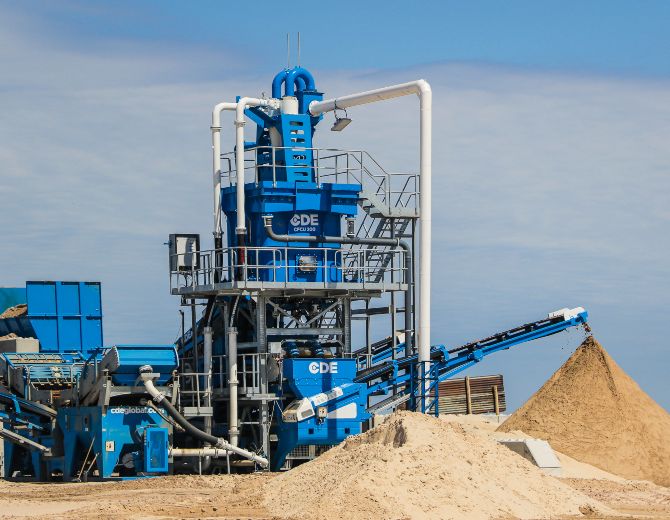Tonnage
200tph
Material
Sand & Gravel
Output
Washed 0 – ¼” sand | Washed 0 - #8 sand

THE CHALLENGE
Wheatcraft Inc. is a family-owned and operated company that has been producing sand and gravel for the central Texas market for almost 40 years. Its Center Point, Texas site focuses on the production of sand gravel for the local ready-mix market.
Wheatcraft is typical of most operations we come across in Texas and other parts of the USA. They had the traditional horizontal classifying tank and sand screw washing equipment which meant they were losing a lot of valuable material to their settling ponds.
This meant lower sand yields and operational inefficiencies. They needed to invest in an upgrade that could integrate with their existing plant and ensure they could operate at full feed capacity.

THE SOLUTION
CDE technical engineers visited the site, analyzed the existing plant’s process, and tested the feed material to provide an informed recommendation. An EvoWash™ sand wash plant was proposed as the solution with substantial benefits over the original classifying tank and screw.
Custom-designed for integration with Wheatcraft's existing plant, the cyclone technology delivers unrivaled control over cut points, helping Wheatcraft nearly double their sand production. It captures fine sand instead of losing valuable material to settling ponds.
“On the sand production, in the past we were doing about 300 tons, now we’re probably doing about 500 tons, and on a real good day we’ll do 600 tons.” Joe Davila, Plant Superintendent.

THE RESULTS
The wash plant now has a production capacity of up to 200 tons per hour, and the equipment paid for itself in as little as 4 months.
Wheatcraft has increased its production level across the board because the plant can now handle the higher feed capacity. With the introduction of the EvoWash™, Wheatcraft has almost doubled its sand production, and its gravels are sold as soon as they hit the ground.
“Right off the bat we knew that we had the right machine for our sand, we knew we were producing more, and yeah it would not be a problem for me to recommend it to anybody else.” Joe Davila, Plant Superintendent




-La-Chola-plant-overview-670x520.jpg?width=670&height=520&ext=.jpg)